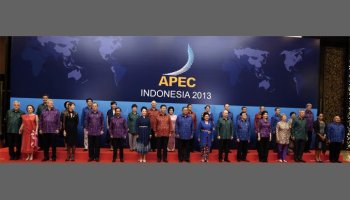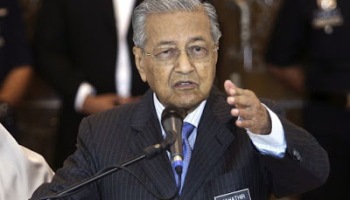 | |
| Illustration: Liu Rui/GT |
‘America First’ undermines multilateralism
According to media reports, the Asia-Pacific Economic Cooperation (APEC) forum held in Papua New Guinea (PNG) was concluded on Sunday without leaders issuing the traditional communiqué, and PNG will instead issue a formal "chairman's statement," for the first time ever. PNG Prime Minister Peter O'Neill said talks broke down over language about the World Trade Organization (WTO).
The US is a strong advocate for WTO reform. While China has no objection for the necessity of reform, the two powers are widely divided over "what" to reform. The US thinks the WTO doesn't fit the current world economy and needs massive reform, but China hopes reform will focus on dispute settlement mechanisms.
China's view is echoed by most WTO members. But some developed countries have vacillated because they worry that the US, if objected, would exit the WTO and build another platform that it thinks enables fair competition. They also hope to benefit from US moves pressuring developing countries. As a major WTO founder, the US intends to overturn the system and start over again. This invites concerns that Washington would choose to support or abandon any international rule based on whether it serves US interest, bringing a fundamental tumult to international trade system.
"America First" has been deeply embedded in US foreign policy. Washington used to pursue its interest by building a US-led multilateral system, but now it just asks for benefits. Multilateral mechanisms are seeing their authority eroded. This will last for some time until Washington feels what repercussions of the collapse of the international system can bring to it.
Such impact will come sooner or later. Current international system carries Western values, endows a US leadership, supports the dollar as a major international currency and helps the US enhance its grip on international relations so that it can secure its interest easily. Destroying such a system will bring itself huge losses in the long run.
It's delusional of some US elites to think that China is the largest beneficiary of the international system since they mistakenly blame China for the US' own problems. China has realized its development through hard work, not by taking advantage of the international system. Though China's economy has rapidly expanded, it is due to China taking up a lot of work that US society doesn't want to do. A large share of China's foreign exchange that the country earned through toils has been borrowed by the US.
"American First" cannot become "America takes all." The US should give other economies room for further development and take care of its relationship with developing countries. All Western countries need to rethink the meaning of fairness. They can't take their vested interests for granted while hoping the developing countries stay at disadvantaged position forever.
Modifying WTO rules must aim at win-for-all, instead of interest redistribution for a few specific countries. It's impossible for the US to be the only winner. If it blocks the development path of other countries, the US itself will go nowhere either.
The APEC summit this year concluded without issuing a communiqué, but it is not a big deal. The summit between Chinese President Xi Jinping and his US counterpart Donald Trump during the G20 meeting later this month will carry much more weight. It is hoped Washington makes serious preparations for the summit and not pin its hopes on exerting pressure.- Global Times.
Pence's APEC speech offers nothing new
 |
| Illustration: Liu Rui/GT |
US Vice President Mike Pence aimed bluntly-worded criticism toward China while delivering a speech at the Asia Pacific Economic Cooperation meeting in Papua New Guinea on Saturday. He repeated the US' hardline approach in its trade conflicts with China, reiterated the US' determination of freedom of navigation and criticized China's foreign aid and cooperation with other countries.
Pence is considered the spokesperson for the US' tough position on China. Apparently, he shoulders the responsibility of piling pressure on China before the summit between Chinese President Xi Jinping and US President Donald Trump during the G20 meeting later this month.
But a few hours before Pence said that the US will not back down from its trade disputes with China unless Beijing bows to US demands, Trump told a number of journalists in the White House that he may not impose more tariffs.
Washington has made quite a lot of noise recently, and Pence's speech at APEC barely offers anything new. Pence said that China's assistance drowns recipient countries in a sea of debt and makes them compromise sovereignty, and that the US offers a "better option."
"We don't coerce, corrupt, or compromise your independence. The United States deals openly and fairly," Pence said. In reality, however, the country that does as Pence described is China and the one that jeopardizes the sovereignty of recipient countries is in truth the US.
The most prominent feature of China's international assistance and cooperation is that it comes with no political strings attached. Is there a better way than this to show respect for others' sovereignty? A big problem in the US' relations with developing countries is that Washington often interferes in their internal affairs. In fact, many Western countries have preconditions, mostly political, attached to their assistance, which touches upon the social governance system of developing countries and hence puts them in difficult positions.
Just look at how many times the US has found political fault with China when it comes to economic cooperation, with human rights issues often brought up during trade negotiations with China. The US also wants to intervene in the business of China's State-owned enterprises. With the US treating the strongest country among its cooperative partners this way, it's easy to imagine what a difficult time it gives to less powerful and underdeveloped countries in trade relations.
If the US can truly behave as Pence claims and make economic cooperation separate from others' sovereignty and based on an equal footing, there would be no major divergence in principles between China and the US. It's a blessing for the world in the 21st century that China emphasizes both sovereignty and equality when it comes to international economic cooperation.
We especially welcome the US to adopt this attitude toward China-US relations and make comprehensive China-US cooperation a role model for the world.
The core consideration of US diplomacy is geopolitics rather than global development. Washington cares about the neighboring regions of major powers and offers its assistance to these regions so as to weaken the influence of regional major powers. Meanwhile, distant countries are forgotten by the US and other Western countries. The South Pacific is one such region. It is China's mutually beneficial cooperation in the region that has drawn the attention of the US and other Western countries back there. The same goes for Africa. A number of African countries used to be ignored by the West in its geopolitical map. However, China's cooperation with Africa has reshaped the attitude of Washington and other Western countries toward Africa.
The China-proposed Belt and Road initiative has been warmly received by a large number of countries because it's not a geopolitical strategy, but a development plan guided by the principles of extensive consultation, joint contribution and shared benefits. It meets the pressing needs of developing countries and hence has ignited their passion for the initiative. When meeting with Xi on Friday, leaders and government representatives of eight South Pacific countries expressed their gratitude for China's longtime assistance and loans that have had no political requirements attached. This is the epitome of how welcome the Belt and Road initiative is.
It is hoped that Pence's words concerning sovereignty, respect and equality can become real action taken as part of US foreign policy. As long as the US has goodwill and real action, it will no longer need to criticize China and other countries will sense this and support it. Belittling a third party is not a noble act on the international stage.- Global Times
Related:
China meets an unequal detractor in US
The Chinese public has the enthusiasm and creativity in executing public diplomacy. They can, and will, find their own way of fighting against foreign provocation. Chinese government shouldn't always be the target and Western countries should also be confronted with China's strong non-governmental voices.High-tech export controls will bring the US no good
Beijing needs to remain calm while Washington is impulsive. It has become a trend in the US to expand technological export restrictions against China, but it's uncertain to what extent Washington will enforce the restrictions. China shouldn't be swayed from the course of opening-up because of Washington's restrictions.Related posts:




